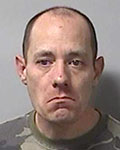
In Genesee County Court today, Matthew T. Zakrzewski faced the metaphorical equivalent of Door 1, Door 2, or Door 3.
Only Door 1 was already open. It contained a maximum prison term on his arson charges of 10 years.
Behind Door 2 is the possibility of 20 years in prison, and behind Door 3 is a jury trial and a possible 40-year prison term if convicted.
Zakrzewski rejected Door 1 because he had done his own research and apparently believes he can beat the five possible felony charges pending against him.
While Zakrzewski's case has not yet been presented to a Grand Jury, he is currently charged with:
- Arson 2nd, intentional with a person present, a Class B felony, arrested on Jan. 16
- Arson 3rd, intentional damage to property, a Class C felony, arrested Jan.17
- Criminal mischief 4th, an A misdemeanor, arrested Jan. 16
- Burglary 2nd, a Class C felony, arrested Jan. 16
- Criminal mischief 3rd, a Class E felony, arrested Jan. 17
- Arson 5th, intentionally damaging property, an A misdemeanor, arrested Jan. 18
- Criminal mischief 3rd, a Class E felony, arrested Jan. 18
District Attorney Kevin Finnell communicated to Zakrzewski's attorney, Fred Rarick, a plea offer that would have Zakrzewski admit to two arson felonies in exchange for a sentence cap of 10 years in prison.
Initially, Zakrzewski accepted the plea offer but after "doing his own research," Rarick told Judge Melissa Cianfrini, Zakrzewski decided there were defenses available to him that might help him beat the charges at trial.
For example, Rarick said Zakrzewski believes he can claim he was drunk at the time of at least one of the crimes and use that as a valid defense.
Rarick said he regrets that there is no way, while Zakrzewski is in the Genesee County Jail, that the attorney could show him video the prosecution could present that purportedly shows Zakrzewski in the act of committing a crime. In his professional opinion, Rarick said, it would be hard to convince a jury, based on that evidence, that Zakrzewski was intoxicated. He isn't stumbling around or displaying other signs of clear inebriation.
In court on Tuesday, Finnell said that if Zakrzewski did not accept the pending plea offer by the end of the hearing, it would be withdrawn, and the cases against him would be presented to a Grand Jury. If indicted, the best plea offer Zakrzewski could hope for was a 20-year prison term. If that was rejected, Finnell noted, and Zakrzewski was convicted at trial, he would face a maximum prison term of 40 years.
Zakrzewski told Cianfrini that he understood the offer and the consequences of rejecting it.
He also said that, based on Rarick's apparent belief that Zakrzewski would be convicted of the charges, he wanted a new attorney.
Cianfrini explained to Zakrzewski in multiple ways that the court had no authority to force the D.A. to reinstate a rejected plea offer, and that once it was withdrawn, it was entirely at the descretion of the District Attorney to decide what, if any, other plea offer might be made.
"It will be out of the court's hands," Cianfrini said. "It is on the District Attorney's authority. The court cannot compel the District Attorney to make a plea offer."
Zakrzewski said he understood that.
She also explained that Rarick had a law degree and passed the bar.
"He has many years of criminal defense experience," Cianfrini said. "His job is to make an assessment of the case based on his training and experience and offer you advice."
"Do you have a law degree?" she asked Zakrzewski.
"No," he said.
Cianfrini told the defendant, "You don't have the background or the training and experience, but it is absolutely your decision." She wasn't trying to influence his decision, she said, but wanted only to make it clear the limits of the court's authority and that once the decision was made, it couldn't be undone.
"His job is to look at the evidence and advise you," she said. "When he tells you things, he's not working against you. He's telling you based on his experience and training, this is what he thinks."
Rarick said that while in his professional opinion Zakrzewski should accept the plea offer, he was ready and willing to assist Zakrzewski in pursuing his right to challenge evidence, make motions, and mount a defense.
After the discussion, Zakrzewski agreed, at least for the time being, to keep Rarick as his attorney.
The 42-year-old Zakrzewski is accused of setting a chair on fire at Washington Towers in mid-January. Later in January, he was accused of starting a fire at a residence on Bank Street earlier in the month. He was later arrested in connection with a reported mid-January fire, also on Bank Street.

A man who is his own lawyer
A man who is his own lawyer has a fool for a client.